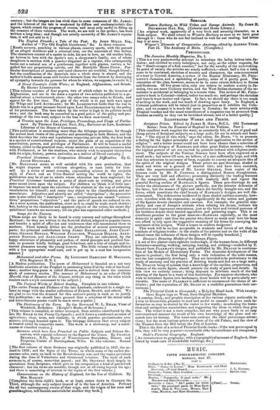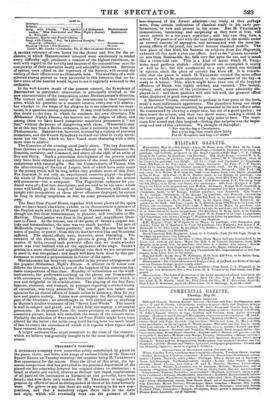MUSIC.
FIFTH PHILHARMONIC CONCERT. MONDAY, MAY 27.
PART I.
Sinfouia in II flat, (No.4) Duet, " Stung by horror." Miss RAINFORTII and Herr STAUDIGI.. (PJSCal Brute) Concert..., Violin, Herr JOACHIM..
Overture
Duet., ^ Nazarene, 0 qual ardir," Mr
MACRINand Herr STAUDIOL
Quieten° e Cato, godaa her fetid- (Faust) ... SPURS. tade," the principal parts by Miss RAM- luau", Miss A. WII.1.1614S, Messrs. MAN-
MActzw, and Heir STAUDJOL. liscraovex.
J. L. HA770:1. 13LETRUVSN.
Pane II.
Overture.
Scherzo
Song, with Chorus. " You spotted (A Midsummer MENDELSIPOHN snakes," Miss RAINFoRTH and Miss Night's AVMS) Baurrecnuir.
A. WILLTAms Notturna. March. and Finale-Chorus
song. with Chorus. " Joy, 'tie a glorious thought," Herr STAMM.. (Melia) Berreovax. Hunting Chorus. (The Seasons) HAYDN. Leader. Mr. Loses-Conductor, Dr. F. MENDELSSOHN BARTHOLDY.
A swans rehearsal of two hours for the chorus and five for the or- chestra, in which MENDELSSOHN laboured most assiduously to render every difficulty safe, produced a concert of the highest excellence, as well with regard to the novelty and interest of the compositions as to the complexity of their execution neatly and admirably mastered. Sections of operas, once added to the repertory of the Society, will extend the variety of their effects over an illimitable field. The auxiliary of a well- selected chorus proved so very successful in this instance, that we be- lieve none of the hearers would regret to see it regularly annexed to the orchestra.
In the well-known music of the present concert, the Symphony of BEETHOVEN in particular, observation is principally directed to the new characteristics of the composition under MENDELSSOHN'S direction. The correct and careful entry of the instruments in their respective solos, which his presence in a manner insures, every one will admire ; but whether in the tempo of his allegros he is not sometimes too impe- tuous, is a question among musicians. It may seem ludicrous to extend this doubt to the time in which he conducts his own Overture, The Midsummer Night's Dream ; but hearers are the judges of effect, and among these we have heard competent musicians pronounce it " too fast," without the power of disagreeing with them. Whatever it may be at this rate from a Berlin orchestra, clear it certainly is not from the Philharmonic. BEETHOVEN, however, is tested by a variety of previous sensations, and the Fourth Symphony realized our ideal in every move- ment but the last, which we have found more charming with a little mere time to admire.
The Concerto of the evening stood justly alone. The boy Joacurs, from thirteen to fourteen years old, has obtained on his instrument the firmness, certainty, and command, and above all the style, of an artist of five-and-thirty. Such a precocious development of the powers could only have been obtained by a combination of the most favourable cir- cumstances with natural gifts. But the Conservatorio of Vienna, with the after-training of DAvm of Leipsic, both of which have some merit in the young artist, will be long before they produce more of this fruit. For Joscsum is not only an experienced concerto-player—he played the whole of BEETHOVEN'S Concerto from memory, with the utmost self-possession—but a composer. The Paganinian cadences he pro- duced were of a first-rate description, and are said to be his own ; which some will hardly go the length of believing. However, with such an insight into composition as these clever effusions displayed, he cannot be long in setting scepticism at rest by some production entirely his own.
The Duet from Pascal Bruno, together with some pieces of the opera that we have heard elsewhere, exhibit as its characteristic a mixture of the English style with that of WEBER and MARSCHNER. The music, though not free from reminiscences, is pleasant, and creditable to Mr. Emote. Great justice was done to the grand and magnificent Over- ture to Faust. At the minuet, one of the gems of SPOHR'S elegant me- lody and harmonization, the time was too much hurried. The part of Ideflstofole requires a " basso profondo," and Mr. MACHIN has no low notes of quality or power : from this the duet between him and STAUDIOL suffered. The choral effects were, however, most charming. The entrance of the chorus, while the polacca is going forward in the misica di hallo, created such powerful effect that we doubt whether more was ever realized with all the appliances of the stage. SPOHR'S genius, in a more cheerful and magnificent vein than we are accustomed to meet it, was recognized ; and much will have been done by this per- formance to extend a prepossession in favour of the opera. MENDELSSOHN has been very successful in his present enlargement of the popular Midsummer Night's Dream. A. scherzo in G minor now follows the Overture, which is one of the happiest of his numerous fan- tastic compositions of that class. Rapidity of articulation on the wind- instruments, the performers catching up the phrase one from another with uncommon velocity, gave the character to this scherzo, which is new and delightful in its combinations. The playing of the first flute, bassoon, clarionet, and trumpet, in passages requiring a critical nicety of execution, was truly admirable. The vocal part was rather con- spicuous for its choral effects of female voices in harmony, than for any new and quaint melody. Voices now accompany the fluttering minor part of the Overture ; an afterthought as well carried out as anything in HAYDN'S similar treatment of the " Seven Last Words." The march is well developed and grand, and would fitly accompany a triumphal procession. In its present form the music produces an agreeable and connected picture, which will embellish the music of the concert-room. Probably the selection of STAUDIGL'S air from Fidelio might have been altered for the better ; the noble song itself having been too much heard of late to create the sensations of which it is capable when repose shall have restored its novelty.
A larger audience than usual remained to the close of the concert ; which we believe was generally thought to be the most interesting of the season.



























 Previous page
Previous page